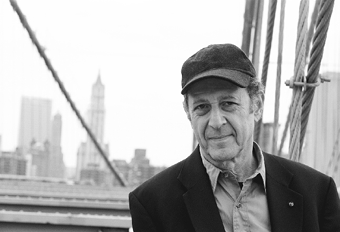New York celebrates composer with a month of performances
The music may be minimalist, but the numbers are not. At 70, perpetually baseball cap-clad New York composer Steve Reich, whose groundbreaking compositions have helped change the course of music in the latter 20th century, continues to produce works whose repeating patterns and ever-varying textures dazzle the senses with their brilliance and complexity.
Just last month, as if in affirmation of Reich’s continuing vitality, classical music magazine Gramophone and New York-based classical radio station WQXR-FM awarded one their first annual WQXR Gramophone American Awards to the Nonesuch recording of Reich’s “You Are (Variations)” (2003). The work was released last year, paired with “Cello Counterpoint” (2003). Both works are also included in “Phases,” a just-released, five-CD career retrospective set from Nonesuch that features 14 of Reich’s best-known compositions.
Listening to the latest recordings of Reich’s work, one is struck by his continued fascination—some might say obsession—with the emotional impact of repeated patterns and variations. “Cello Variations” for eight cellos, recorded in a multi-track version by cellist Maya Beiser, conveys some of the same upbeat, non-stop energy as two other classic Reich compositions—the irresistibly upbeat “Music for 18 Musicians” (1976), whose ability to stimulate endorphins in live performance invariably leaves audiences cheering, and “New York Counterpoint” (1985), whose three movements (“Fast,” “Slow,” “Fast”) mirror the multi-facetted energy of the city that never sleeps. Although the form of “New York Counterpoint’s” final movement is anything but Mozartian, Reich’s mind-blowing, foreground/background auditory effects share with Wolfgang Amadeus’ endlessly inventive, perfectly balanced scales and variations with the rare ability to convey unfettered joy.
The four movements of “You Are (Variations),” each set to a different short text, bring together several keys aspects of Reich’s personal history—his studies of philosopher Ludwig Wittgenstein at Cornell University, which preceded his immersion in music at New York’s Juilliard and Oakland’s Mills College, and his affinity for the Jewish faith. Taken as a whole, the four texts—“You are wherever your thoughts are,” “Shiviti Hasem l’negdi (I place the Eternal before me),” “Explanations come to an end somewhere,” and “Ehmor m’aht, v’ahsay harbay (Say little and do much)”—set forth a quasi-mystical perspective on life that finds its musical counterpart in Reich’s scoring.
A turning point in Reich’s life came in the fall of 1964, when he participated in the first hypnotic performance of Terry Riley’s “In C.” That seminal work, which earned Riley the title “The Father of Minimalism” consists of 53 repeated patterns that came to Riley while he was stoned, riding the bus to his piano improv gig at San Francisco’s Gold Street Saloon. He wrote the patterns down afterwards, and spent the next while figuring out what to do with them. The answer, in part—let the performers decide.
In 1965, at a time of emerging youth consciousness and rejection of conformity, Reich’s experimentations with spoken word led him to manipulate and overlap recorded tracks of a Pentecostal preacher shouting “It ain’t gonna rain!” Around the same time, Reich generated another seminal work, “Come Out,” which he created by overlapping the voice of an African-American man who was subject to police violence in a Harlem police precinct house.
I have no idea if Reich ever inhaled, but the out of phase effects he achieves in such compositions as “Drumming,” when the timing of different lines slowly shifts, can induce a euphoric “lift off” high similar to that experienced at the start of acid-augmented journeys. Such highs, it must be noted, are only possible when one relinquishes traditional expectations of musical structure, and gives oneself over to Reich’s unceasing fascination with permutations and combinations. The same slowly evolving, repeating patterns that left me feeling stoned beyond belief and caused my husband to flee from the room, screaming, “Enough of the CD that never ends!” Not everyone is equally transfixed.
Reich is currently being honored by a month-long Reich@70 celebration in the Big Apple. Other concerts and events are scheduled for the United Kingdom, St. Louis, Los Angeles, and major European centers. Why Reich celebrations are not scheduled for other parts of the United States, especially San Francisco, where San Francisco Symphony Orchestra conductor Michael Tilson Thomas has been known to champion Reich’s work, is beyond comprehension.
Coming up, Carnegie Hall focuses on Reich’s instrumental music. On October 19, at the conclusion of a Reich-led seven-day Professional Training Workshop, workshop participants will present a concert of his works in Zankel Hall. On October 21, Carnegie’s Stern Auditorium hosts a program of Reich’s masterworks performed by the artists for whom they were written—“Electric Counterpoint,” played by guitarist Pat Metheny; “Different Trains,” with the Kronos Quartet; and “Music for 18 Musicians,” performed by Steve Reich and Musicians.
On October 22, Carnegie Hall hosts a daylong exploration of Reich’s music. It includes “Discovery Day: Steve Reich,” an afternoon of lecture, discussion, film, and participatory music-making in Weill Recital Hall, followed by the evening’s “Making Music: Steve Reich” concert in Zankel Hall. The Zankel program begins with a conversation between the composer and Carnegie Hall’s Artistic Advisor, Ara Guzelimian, and includes the U.S. premiere of “Daniel Variations,” a tribute to the murdered Wall Street Journal reporter Daniel Pearl, co-commissioned by The Carnegie Hall Corporation. “Daniel Variations” is but one of many works (“Different Trains” being another) in which Reich’s social consciousness rises to the forefront.
Lincoln Center concludes the Reich@70 celebration with an emphasis on Reich’s vocal and dramatic works. On October 28 in Alice Tully Hall, Grant Gershon conducts the Los Angeles Master Chorale in the New York premiere of “You Are (Variations)” for voices and chamber ensemble. The work is paired with one of Reich’s many Jewish-themed works, “Tehillim.” November 2-4, Brad Lubman leads the Steve Reich Ensemble in “The Cave,” Reich’s groundbreaking video opera collaboration with video artist Beryl Korot.
gaycitynews.com


































